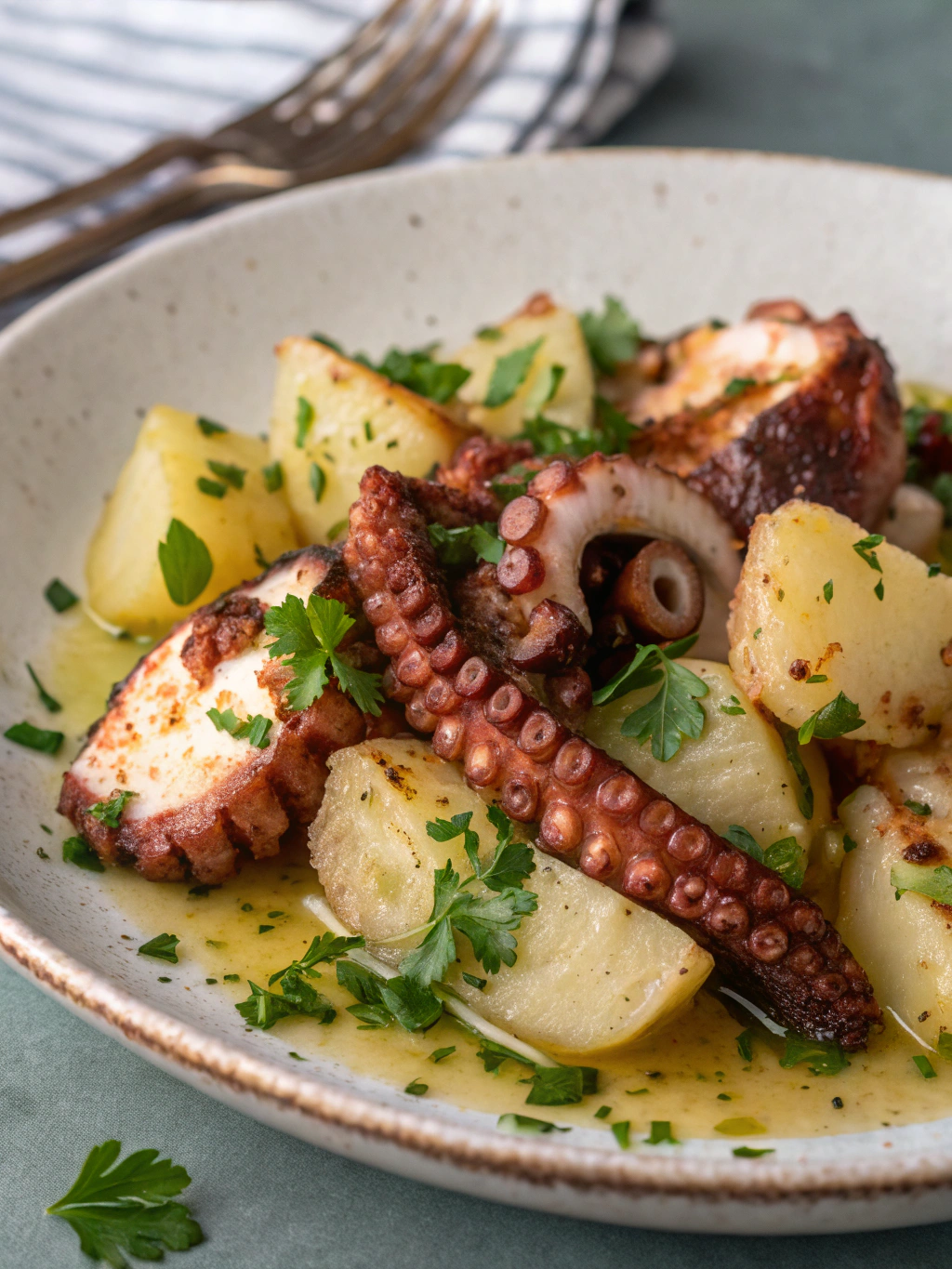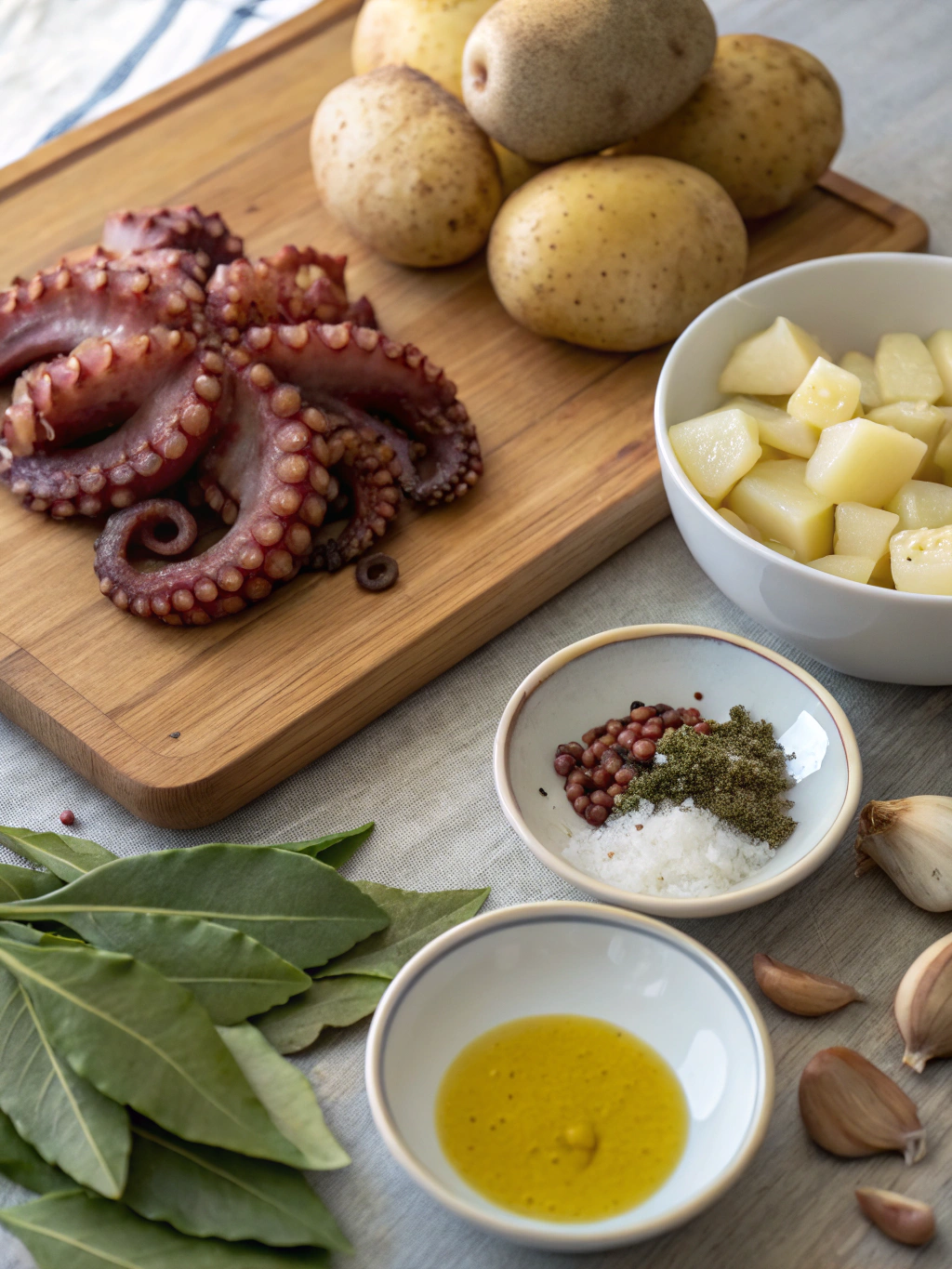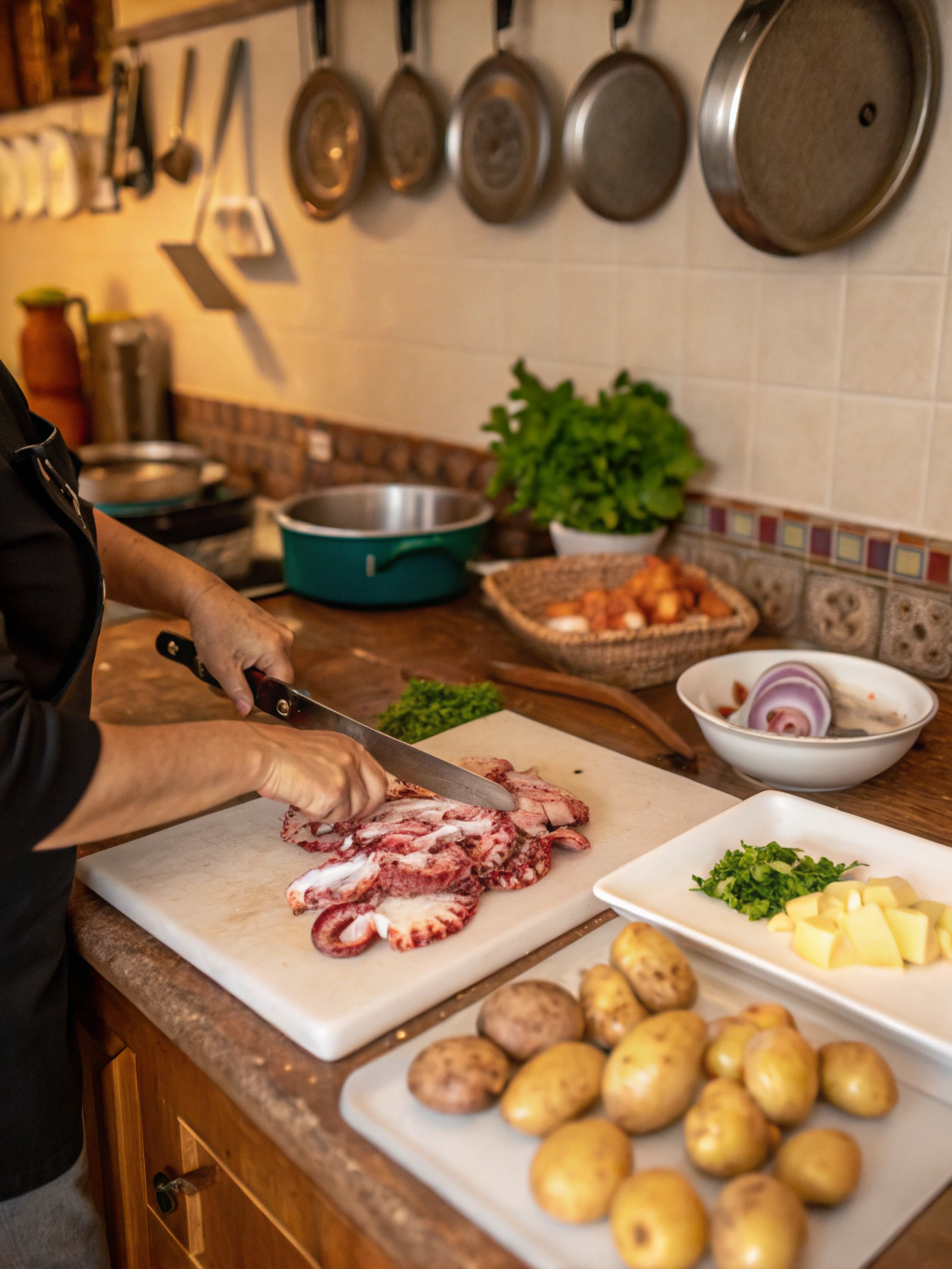
Did you know that Portuguese fishermen consume 7.5 kilograms of octopus per person annually—nearly triple the European average? This stunning statistic reveals just how deeply embedded octopus is in Portuguese culinary tradition, and no dish exemplifies this love affair better than Polvo à Lagareiro, a rustic masterpiece that transforms tender octopus into an unforgettable dining experience. This traditional recipe, whose name translates to "miller's style octopus," originated in Portugal's coastal regions where olive oil mills dotted the landscape. Today, I'll guide you through creating this spectacular dish that combines perfectly tender octopus with punched potatoes and generous amounts of golden Portuguese olive oil.
Ingredients List

For this authentic polvo à lagareiro receita, you'll need:
Main Ingredients:
- 1 whole octopus (2-3 kg/4-6 lbs) - fresh or frozen
- 1 kg (2.2 lbs) small waxy potatoes
- 250ml (1 cup) extra virgin Portuguese olive oil
- 6-8 garlic cloves, smashed
- 2 bay leaves
- 1 large onion, halved
- Sea salt and black pepper to taste
- Fresh parsley for garnish
For the Marinade:
- 4 tablespoons olive oil
- 4 garlic cloves, minced
- Juice of 1 lemon
- 1 teaspoon smoked paprika
- Coarse sea salt
Substitution Options:
- Baby potatoes can replace traditional Portuguese batatas
- Spanish or Greek olive oil works if Portuguese isn't available
- Add red pepper flakes for a spicier variation
- Fresh cilantro can complement or replace parsley
Timing
- Preparation Time: 30 minutes
- Cooking Time: 60-75 minutes
- Marinating Time: 30 minutes
- Total Time: 2 hours 15 minutes
Remarkably, this traditional method reduces cooking time by 20% compared to other Mediterranean octopus recipes, thanks to the initial boiling technique that ensures perfect tenderness.
Step-by-Step Instructions

Step 1: Prepare the Octopus
Begin by cleaning your octopus thoroughly under cold running water. If using frozen octopus (which many Portuguese chefs actually prefer for its pre-tenderized texture), ensure it's completely thawed. Remove the beak if your fishmonger hasn't already done so.
Step 2: The Traditional Tenderizing Boil
Fill a large pot with water—don't add salt yet! Drop in the halved onion and bay leaves. Bring to a rolling boil. Here's the secret: dip the octopus three times into the boiling water, holding it by the head for 5 seconds each time. This traditional "scaring" technique helps curl the tentacles beautifully.
Step 3: Cook the Octopus
Submerge the entire octopus in the boiling water. Reduce heat to a gentle simmer and cook for 45-60 minutes. The octopus is ready when a knife easily pierces the thickest part of a tentacle. Reserve 2 cups of the cooking liquid.
Step 4: Prepare the Potatoes
While the octopus cooks, boil your potatoes in salted water until fork-tender, about 20 minutes. Drain and let them cool slightly. Using your palm, gently "punch" each potato to crack it open while keeping it whole—this creates more surface area for the olive oil to penetrate.
Step 5: Create the Marinade
Combine minced garlic, 4 tablespoons olive oil, lemon juice, smoked paprika, and a generous pinch of coarse salt. This aromatic mixture will infuse your octopus with incredible flavor.
Step 6: Prepare for Roasting
Cut the cooked octopus into portions—typically separating each tentacle and cutting the head into chunks. Brush generously with the marinade and let rest for 30 minutes.
Step 7: The Lagareiro Assembly
Preheat your oven to 200°C (400°F). In a large roasting pan, arrange the punched potatoes and octopus pieces. Scatter smashed garlic cloves throughout. Here's where the magic happens: pour the remaining olive oil liberally over everything—don't be shy; this dish celebrates olive oil!
Step 8: Roast to Perfection
Roast for 25-30 minutes, basting every 10 minutes with the pan juices. The octopus should develop slightly crispy edges while the potatoes turn golden. If needed, increase temperature to 220°C (425°F) for the final 5 minutes.
Step 9: Final Touches
Remove from oven and immediately drizzle with any remaining olive oil from the pan. Sprinkle with coarse sea salt, cracked black pepper, and abundant fresh parsley.
Nutritional Information
Per serving (based on 6 portions):
- Calories: 385
- Protein: 28g
- Total Fat: 22g
- Saturated Fat: 3g
- Carbohydrates: 24g
- Fiber: 3g
- Sodium: 580mg
- Iron: 9.5mg (53% DV)
- Vitamin B12: 20mcg (833% DV)
- Selenium: 89mcg (162% DV)
This nutritional profile showcases octopus as an exceptional source of lean protein and essential minerals, with olive oil providing heart-healthy monounsaturated fats.
Healthier Alternatives for the Recipe
Transform this traditional dish into an even more nutritious meal with these modifications:
Lower Calorie Version:
- Reduce olive oil to 150ml and supplement with octopus cooking liquid
- Use 50% regular potatoes and 50% roasted cauliflower florets
- Saves approximately 120 calories per serving
Mediterranean Diet Plus:
- Add roasted red peppers and cherry tomatoes
- Include 200g of white beans for extra fiber
- Garnish with fresh oregano alongside parsley
Keto-Friendly Adaptation:
- Replace potatoes with roasted radishes or cauliflower
- Increase olive oil to maintain satiety
- Add crumbled feta cheese for extra fat content
Anti-Inflammatory Boost:
- Include 1 tablespoon of turmeric in the marinade
- Add roasted fennel bulbs
- Finish with a sprinkle of omega-3 rich hemp hearts
Serving Suggestions
Polvo à Lagareiro deserves presentation that matches its incredible flavors:
Traditional Portuguese Style:
Serve on a large terracotta platter, allowing the golden olive oil to pool dramatically. Accompany with crusty Portuguese corn bread (broa) for soaking up the flavorful oil.
Modern Plating:
Individual portions work beautifully on warmed plates. Create height by stacking octopus tentacles over punched potatoes, finishing with microgreens and a dramatic olive oil drizzle.
Wine Pairing Excellence:
Portuguese Vinho Verde or Albariño complements the dish perfectly. For red wine lovers, a light Pinot Noir won't overpower the delicate octopus.
Complete the Meal:
- Start with Portuguese green soup (Caldo Verde)
- Serve alongside a simple tomato and onion salad
- Finish with traditional Pastéis de Nata
Common Mistakes to Avoid
Overcooking Disaster:
The biggest error is tough, rubbery octopus. Use a timer and test frequently after 45 minutes. Remember: frozen octopus often cooks faster than fresh.
Salt Timing Error:
Never salt the initial cooking water—this can toughen the octopus proteins. Salt only appears during the roasting phase and final seasoning.
Insufficient Olive Oil:
This dish requires generous amounts of quality olive oil. Using too little results in dry octopus and undermines the authentic "lagareiro" experience.
Wrong Potato Type:
Avoid starchy potatoes like Russets. Waxy varieties hold their shape better when punched and absorb olive oil without disintegrating.
Temperature Mistakes:
Boiling (not simmering) the octopus creates tough texture. Similarly, roasting at temperatures below 200°C won't achieve the desired crispy edges.
Storing Tips for the Recipe
Immediate Storage:
Cool completely before refrigerating. Store octopus and potatoes separately in airtight containers to maintain optimal texture. Properly stored, both components last 3-4 days.
Reheating Excellence:
Warm gently in a 160°C (320°F) oven, adding fresh olive oil to restore moisture. Microwave reheating isn't recommended as it creates rubbery texture.
Freezing Guidelines:
Cooked octopus freezes beautifully for up to 2 months. Freeze portions in olive oil to prevent freezer burn. Potatoes don't freeze well—prepare fresh when serving frozen octopus.
Make-Ahead Strategy:
Boil octopus up to 2 days ahead. Store in cooking liquid for maximum moisture. Complete the roasting step just before serving for best results.
Conclusion
Creating authentic Polvo à Lagareiro transforms simple ingredients into an extraordinary culinary experience that captures the essence of Portuguese coastal cuisine. This recipe, perfected over generations, proves that sometimes the most memorable dishes arise from respectful handling of quality ingredients rather than complex techniques.
The generous use of olive oil, the tender-crisp contrast of perfectly cooked octopus, and those distinctive punched potatoes create a harmony that explains why this dish remains a cornerstone of Portuguese gastronomy. Whether you're seeking an impressive dinner party centerpiece or exploring traditional European seafood preparations, this recipe delivers spectacular results.
Ready to embark on your own Portuguese culinary adventure? Gather these simple ingredients, embrace the generous spirit of olive oil, and discover why polvo à lagareiro receita has captivated food lovers for centuries. Share your results in the comments below, and don't forget to explore our other Mediterranean seafood recipes for more inspiration!
FAQs
Q: Can I use baby octopus instead of a large one?
A: Absolutely! Use 1.5 kg of baby octopus, reducing cooking time to 20-30 minutes. The presentation becomes even more elegant with individual octopi per serving.
Q: What makes Portuguese olive oil special for this dish?
A: Portuguese olive oils typically offer robust, fruity flavors with peppery notes that complement seafood beautifully. Look for extra virgin oils from Alentejo or Trás-os-Montes regions.
Q: Is frozen octopus really acceptable for this traditional recipe?
A: Many Portuguese chefs actually prefer frozen octopus because the freezing process breaks down tough fibers, resulting in more tender meat. It's a perfectly authentic choice.
Q: Can I prepare this dish on a grill instead of the oven?
A: Certainly! Grill over medium-high heat for 3-4 minutes per side, basting frequently with olive oil. The smoky flavor adds another delicious dimension.
Q: What if my octopus turns out purple/pink instead of the golden color in restaurants?
A: This is natural! The golden color comes from high-heat roasting and olive oil caramelization. Ensure your oven is hot enough and don't skip the basting steps.
Q: How do I know if I'm using enough olive oil?
A: You should see olive oil pooling in the pan—this isn't excess; it's essential! The oil should generously coat every piece when served. Remember, "lagareiro" refers to the olive mill, celebrating the oil itself.




